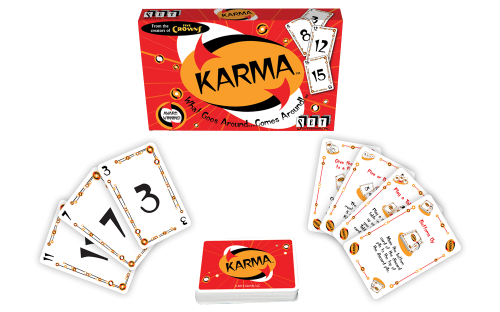Welcome to Purple Pawn, covering games played around the world by billions of people every day.
With Karma, from Set Enterprises, you get a deck of cards numbered 1-16 three times—plus 12 special “Karma” cards. The goal is to get rid of all your cards by dropping on to the discard pile a card that’s equal-to or greater than the card placed by the last player. If you can’t play up, as it were, the whole discard pile becomes yours.
It’s a basic style of gameplay that you’ve probably experienced before. What Karma adds to that, though, includes:
- A set of three face-down and three face-up “table cards” for each player. These are also cards you must get rid of in order to go “out” but which you can’t in general play until your hand is empty.
- The ability to play multiple cards. That is, on the same turn you can play two or three of the same card as a way of emptying your hand faster. Additionally, whether they’ve been played by just one or multiple players, whenever three of the same cards are on the top of the discard pile, that whole pile is taken out of the game.
- Karma cards, which when played allow you to do special things like play one of your table cards early or force another player to just take the discard pile out-of-turn.
All together, this makes for a serviceable light, social card game if that’s what you’re looking for. Play is rapid. Decisions are easy. The game has a take-that element. And the relative fortunes of players can reverse quickly.
Personally, however I don’t particularly enjoy Karma. Whether it usually goes that way or not, Karma feels like a game that could last forever. The fewer cards you have in your hand, the more likely it will be that you’ll have to take the discard pile. Even when you get down to your last three table cards, those are the face-down ones, which you have to play without looking. If the one you play is a lower number than the last played card, there you are starting over with a full hand. When I played, I actually found myself intentionally saving up and laying down triples just to move the game along.
Another thing that bothers me a little about Karma is the way the game defines winners and losers. According to the rules, you keep playing until all but one person has gotten rid of all their cards. All those people are winners. The one player left with cards is the loser. It’s not a big deal for a group of adults. However, it seems to me not an especially nice way to end a social card game by declaring one lone loser.
A complimentary copy of Karma was provided by Set Enterprises for review.
No Comments
Sorry, the comment form is closed at this time.
Trending
- Massdrop.com
- Oh the Irony—Illuminati Card Game Continues to Inspire Conspiracy Theorists
- Footprints, an Educational Ecology Game
- Home
- USPS Adds Board Game Flat Rate Box
- Baila, the Estonian Drinking Card Game
- Crystal Caste Wins Dice Patent Suit Against Hasbro
- Mirror Game, Red and Blue
- Are Board Games Dangerous?
- Board Games Based on Hindu Mythology
Archives
Most Popular Articles
- Oh the Irony—Illuminati Card Game Continues to Inspire Conspiracy Theorists
- The 20 Most Valuable Vintage Board Games
- The Truth About Dominoes On Sunday in Alabama
- Sequence Game, and Variants
- USPS Adds Board Game Flat Rate Box
- Baila, the Estonian Drinking Card Game
- The 13 Most Popular Dice Games
- Are Board Games Dangerous?
- Guess Who? The Naked Version
- What Happened to the Jewel Royale Chess Set?
Recent Posts
- Toy Fair 2019—Breaking Games
- Talisman Kingdom Hearts Edition
- Toy Fair 2019—Winning Moves
- Toy Fair 2019—Games Workshop
- Toy Fair 2019—Star Wars Lightsaber Academy
- Toy Fair 2019—Stranger Things Games
- Toy Fair 2019—HABA
- Licensing Roundup
- Game Bandit
- 2018 A Difficult Year For Hasbro But Not For D&D Or MtG
Recent Comments
- on Toy Fair 2019—Winning Moves
- on Game Bandit
- on Second Look—Dungeons & Dragons Waterdeep Dragon Heist
- on Crowdfunding Highlights
- on Beyblade SlingShock
- on Game Bandit
- on Game Bandit
- on Watch This Game!, the Board Game Review Board Game
- on Second Look—Vampire: The Masquerade 5th Edition
- on Palladium Books Loses Robotech IP License, Cancels Five-Year-Overdue Robotech RPG Tactics Kickstarter





